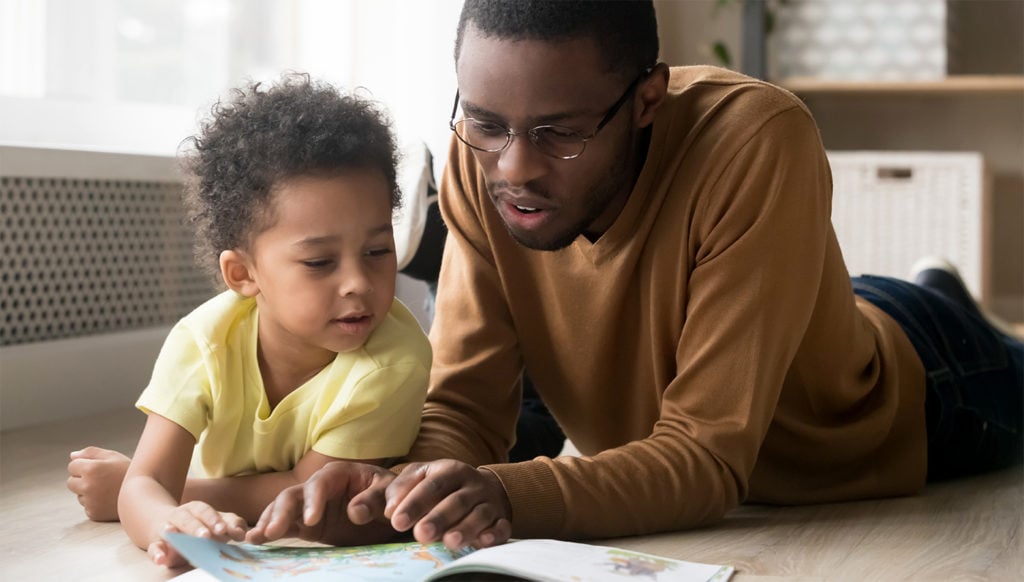Reading
Reading With Your Child At Home & How To Do It Right
In the first few years of school, most children bring books home to read with their parents as part of the school reading program. Parents are often given a briefing on how to listen to these readers through a parent/teacher information session or through advice given via a note sent home.
Despite this, many parents remain unsure how to best listen and assist their children, particularly when they make mistakes or they can’t figure out a word/text.
This is unfortunate as reading at home can be such an enjoyable and extremely valuable addition to a child’s learning, not to mention a wonderful positive time for nurturing both the relationship and a love of reading.
Giving and seeking advice on listening to home readers can be difficult because there are differing opinions on how to best teach literacy. I don’t know of anyone who has all the answers, though there are some who claim to have the only ‘right’ way and everything else is the ‘wrong’.
Every child is unique and there is no one generic model/technique that will suit every child in every instance. There is no “one size fits all” prescription.
To help give parents more specific and practical advice on how to listen to their children at home, the following is to provide general guidelines and specific techniques that have been found effective over the years, and to outline some of the basic principles that underlie reading. However please keep in mind that we are constantly learning and improving our knowledge and skills. This is just some of what can be done. Try all of it or part of it, modify it, use it as a framework, and add to it from other sources… I hope that it will give you a foundation with which to begin listening with confidence to your children and help make the process more enjoyable and worthwhile for you and your children.
Reading at home should be enjoyable for you and your child
If the experience is fun, satisfying and positive then your child will be far more likely to want to read next time. And, the more children practice then the faster their skills & confidence improve. Keep in mind that it usually takes two to three years for children to learn to read at an independent level. Of course, some children will take a little longer and some a little less. Either way, children only learn to read once. Be patient, realistic, and enjoy the process, as well as the time you have together.
Choose a Desirable Time and Place
Set your child up for success. Find a spot that is comfy and free from distractions (turn the TV off, send the other kids outside). If you or your child is busy, tired, cranky (or all of the above!) tolerance and concentration levels will be decreased. Remember reading should be enjoyable! Sit at a table with the book on a sloped work surface is the best environment to read. However you can sit on a couch, or even lay on the carpeted with cushions. Do what will make your child enjoy reading time. You can even read when going to bed, but be warned!
If your child is tired, they are more likely to make mistakes and become frustrated, leading to more mistakes etc. It is best to have your child sit on your left so their right ear is closest. The right ear has the fastest route to the left hemisphere of the brain, which almost always processes language. Plus, sitting this way introduces a routine and a sense of predictability. Speaking of routines, many children thrive with consistency, and it may be worthwhile reserving a consistent time each day to read.
Keep Reading Time Short
When reading to you child at home keep it short and sweet. Children are far more likely to make mistakes and become frustrated if they become tired or lose concentration. Adults take reading for granted and often forget that learning and practicing to read can be exhausting. So, keep your reading time brief – 5 to 10 minutes in one sitting is plenty for most young children.
Be Positive & Encouraging
This is especially true when they are learning and practicing new skills. Notice things that they have mastered, or improved upon since prior reading times. Notice things they are doing well. Say things like: “I like the way you figured that out”; “wow, that was great reading”; “gee, I really enjoyed listening to you”; “gosh, you are reading so well, you could read that to Grandma when she comes over” (or, they could read to grandparents over the phone); “I noticed that you remembered that new word…” “very good, you had trouble with that word last time, and this time you got it first go..”; “you are making it look so easy”. Sometimes show a previous book to demonstrate how far their reading has come.
Encourage Independence
This can be a little difficult for many parents when there is so much at stake. We love our children so much and we want them to become good readers – there is a lot riding on it. In our eagerness for our children to learn to read, it can be very tempting frankly to ‘butt in’ all the time instead of allowing our children to figure as much of the reading out for themselves. Sometimes we can become so overzealous or overprotective (if they are struggling) that we even take over the reading! In so doing we actually disempower our children and deprive them of opportunities to learn. What we really need to be doing is encouraging our children to do as much of the thinking for themselves as possible.
You can do this by:
- Allow your child enough time to figure things out before jumping in. Children process their thoughts more slowly than adults.
- Allowing time to realize they have made a mistake, and time to fix it as well.
This takes patience, self-control and practice!
Help Your Child When They Need It
I realize this may sound like it contradicts the last point. The thing is, if your child can do the reading or figuring out – then let them! However, if there is no way on this earth that your child is going to be able to figure a particular part of text out for whatever reason (perhaps they simply do not have the required skills yet or perhaps they have never heard of that particular word) – then don’t let them struggle and flounder unnecessarily. The bad news is that it can be tricky to know when to help. The good news is that the more in tune you are with where your child is at with their reading development, and the more you know about the learning to read process, then the easier it becomes.
- If your child is struggling with a word or section of text and you know that your child CAN or may well be able to figure it out – then let them do so, or at least let them give it a try and praise their attempts.
- If you know that your child has come across a similar problem before but is having trouble recalling the solution, you might supply ‘reminders’ rather than directly providing the answer.
- If you know that your child does not have the skills or knowledge to figure a piece of text out with or without hints/reminders, provide the solution quickly without drama and move on. In this case, I might say something like “that’s a tricky word, it says”. Another occasion when you might quickly “jump in” is when the child is starting to lose track of the meaning/story-line.
Lastly, but most importantly, ensure the child is reading at the right level for their current ability
Your child should be able to read the book they have brought home with a high rate of success. They should be able to read much of the book on their own (say, approximately 90% or more) with perhaps a little help from you. Continual struggle leads to negative thoughts/beliefs, low self esteem, a disliking of reading, reading avoidance and lost learning opportunities. Alternatively, continual success leads to high self-esteem, reading enjoyment, willingness to practice and more learning. Therefore, don’t be in a hurry to rush your child through reader levels. Your child will make the most efficient progress if they have books that match their current reading ability. Another thing to keep in mind is that children often hit learning plateaus, where they don’t seem to be making much progress. However these times are valuable days, weeks, months where children consolidate and master skills before taking off on another learning curve.
As far as ‘easy’ books go, while they don’t tend to offer many ‘new’ learning opportunities, they can be useful practice tools where children work on fluency (reading pace), expression and master/consolidate skills such as sight words.
If your child struggles continually with the books they bring home, then I strongly recommend that you speak to their teacher and discuss what is going on at home.
In summary, many parents find listening to their children problematic because they are unsure of what to do when they listen. Do they help? If so, how do they help? When do they help? This article has outlined some general pointers for parents to consider when reading with their children at home.
Contributions by Kirstie Wilson
Kirstie Wilson M. Ed has written a series of three articles in answer to one of the most common dilemmas that parents face when it comes to their children learning to read

